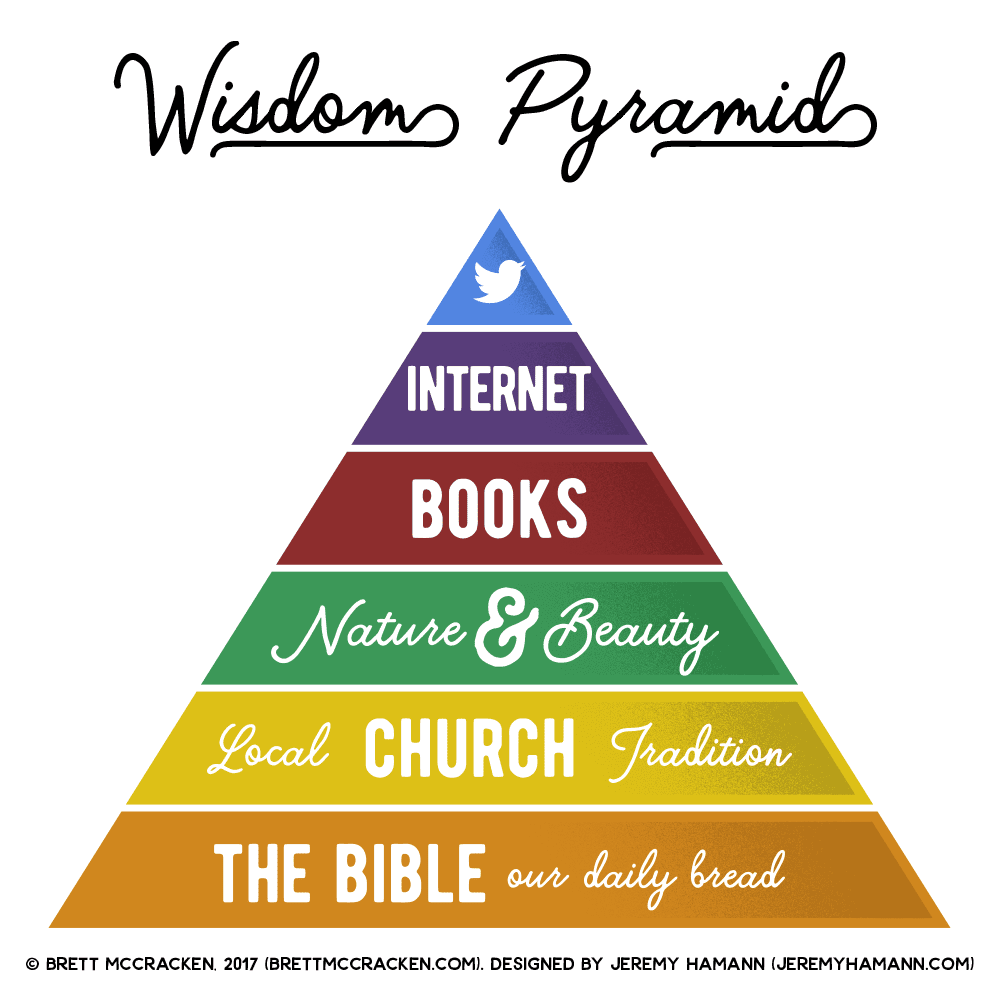
Editor’s Note: To start our New Year, we’re going to be taking an in-depth look at author Brett McCracken’s proposed “Wisdom Pyramid.” Over the course of six days, we’ll look at the roles that the Bible, the church, nature and beauty, books, the internet, and social media play in our lives.
Day Two
The Church: “Local & Tradition”
In the best version of our world, the church is where we learn how to put the wisdom we glean from the Bible into action. No church is perfect, but so many churches are serving the people of God eagerly, with wisdom and grace. How can we partner with the church, actively giving, receiving, praying, and serving those in our community? For myself, I’m trying to discern my role in my current church’s mission and methods toward compassionate, humble, and courageous social justice. What does partnering with a church look like for you?
Questions:
- Do you belong to and/or serve in your local church? Why or why not?
- Is your church using the Bible as the foundation of her wisdom pyramid? What does that look like? Is your church primarily Scripture-based or experience-based? Is Scripture read? Do you talk about the Bible? Why or why not?
- How does your church spend her money? How does she care for the poor and the vulnerable? Is your church tainted with a hidden “health & wealth” theology? Where do you fall in that? Are you comfortable tithing, participating in the church’s vision and values?
- Do you rely on your church to guide you toward wisdom and understanding? Does your church routinely and thoughtfully address current events? Do she guide and equip you for just and merciful action?
- Does everyone in your church look like you? If so, what could you do to encourage your church membership to more closely mirror the kingdom of heaven?
- How could you partner with churches of different neighborhoods, denominations, languages, or income levels? How many churches other than your own have you recently attended?
- What church traditions appeal to you, and help you connect with the living God? Communion, liturgy, service, worship? What other traditions could you explore?
Next Steps
- Determine how many churches are meeting in your area, by driving around and/or doing a Google search. Make note of how many different denominations, ethnicities, socio-economic groups, and worship styles gather on regular weekend. As Jonathan Wilson-Hartgrove writes, “there is a problem with the segregated Sabbath.” Pick three churches you’d like to visit this winter Maybe take other parishioners from your home church with you.
- Review your church’s mission and values statement. Is the Bible mentioned? Look at the budget—how are the church’s funds distributed? If you have questions for your church, prayerfully consider talking with a pastor or elder.
- Read Isaiah 61 and Luke 4:16-30 (“The Spirit of the Lord God is upon me, because the Lord has anointed me to bring good news to the poor; he has sent me to bind up the brokenhearted, to proclaim liberty to the captives, and the opening of the prison to those who are bound.”) Write out Jesus’ explicit mission statement. Contrast that with your church’s. Are there any things you would like to change?
- Brainstorm a couple of ways you’d like to stay connected with the broader, global church, both current and historic. Study the lives of saints from different Christian traditions, listen to music from different denominations, or immerse yourself in the artistic traditions of various branches of the Christian church. Perhaps you could explore the Book of Common Prayer in your personal prayer life, or explore other liturgies such as Every Moment Holy or A Booklet of Uncommon Prayer.
Tomorrow, we’ll explore how wisdom is found in nature and beauty. Before you close this screen, thank God for any wisdom you’ve received from the church.
Aimee Fritz delights in telling long, true stories about compassion, souls, and big mistakes among the everyday absurdities of her suburban life. Long ago she consulted companies, churches, and nonprofits. Now she runs Family Compassion Focus to funnel all that into helping people become lovable and loving World Changers. She recently co-wrote the Family Toolkit (free download) for Kent Annan’s Slow Kingdom Coming: Practices for Doing Justice. Loving Mercy, and Walking Humbly in the World (IVP). To arrange a meeting, a talk, or an article, contact Aimee via e-mail (familycompassionfocus@gmail.com).



